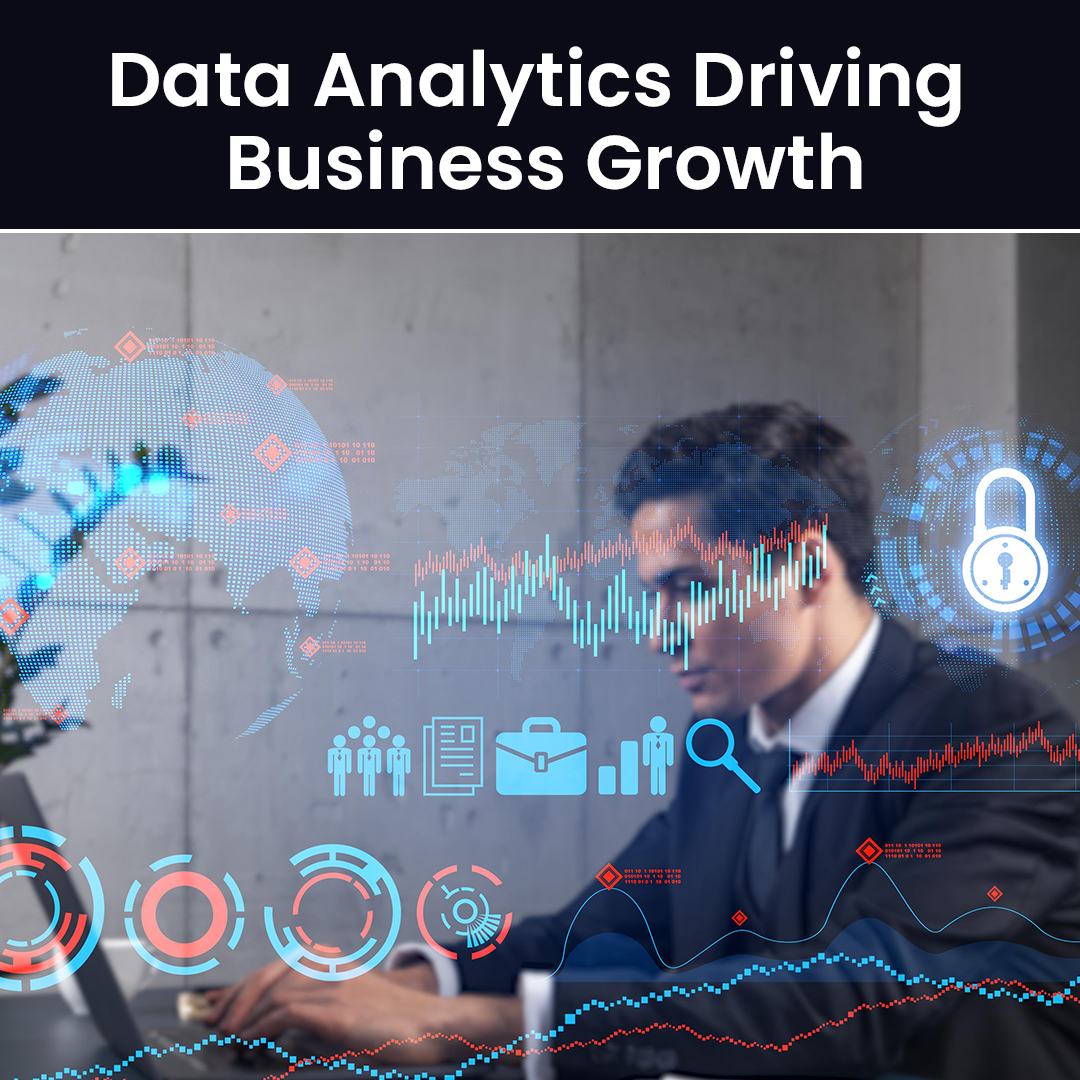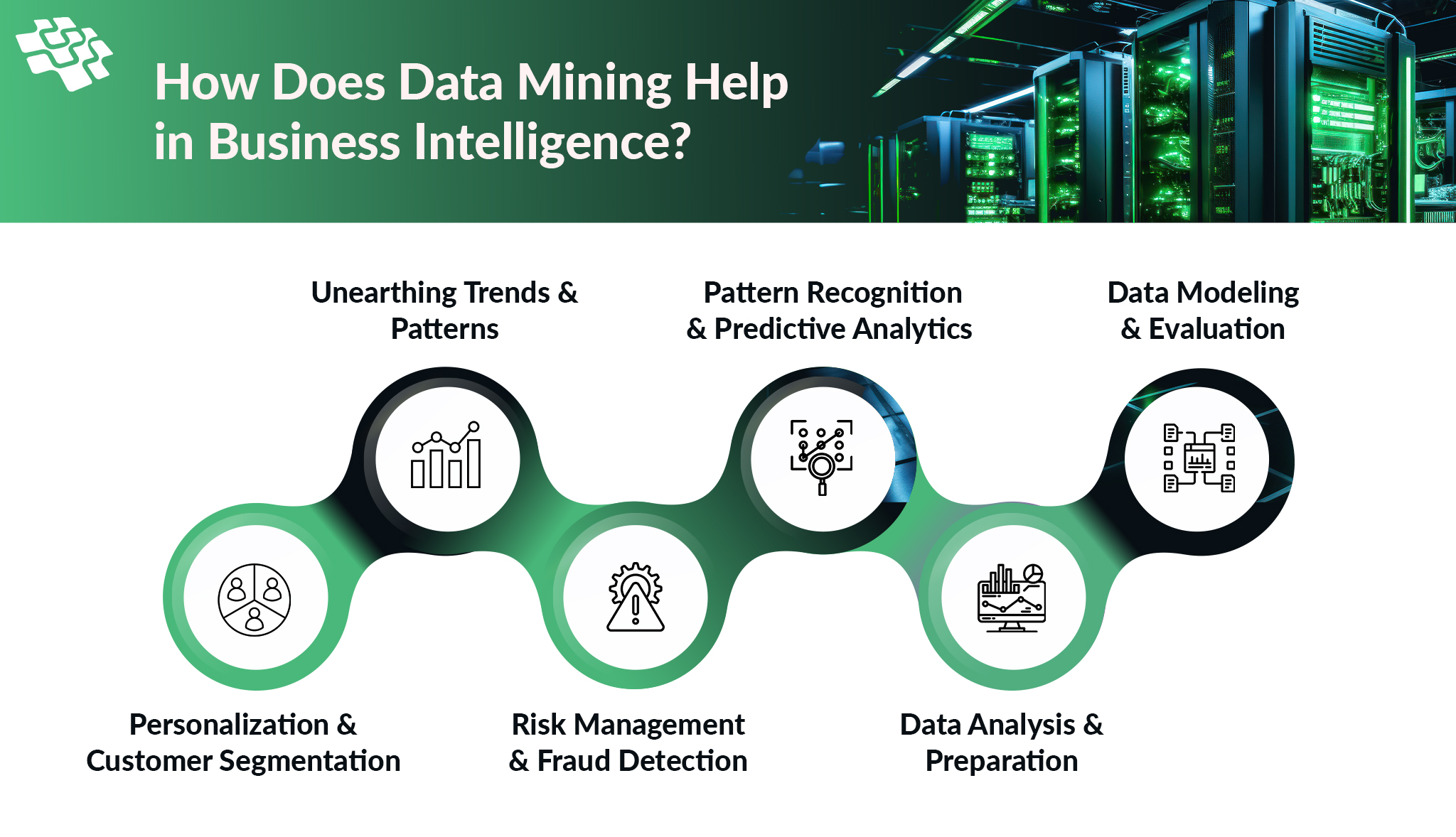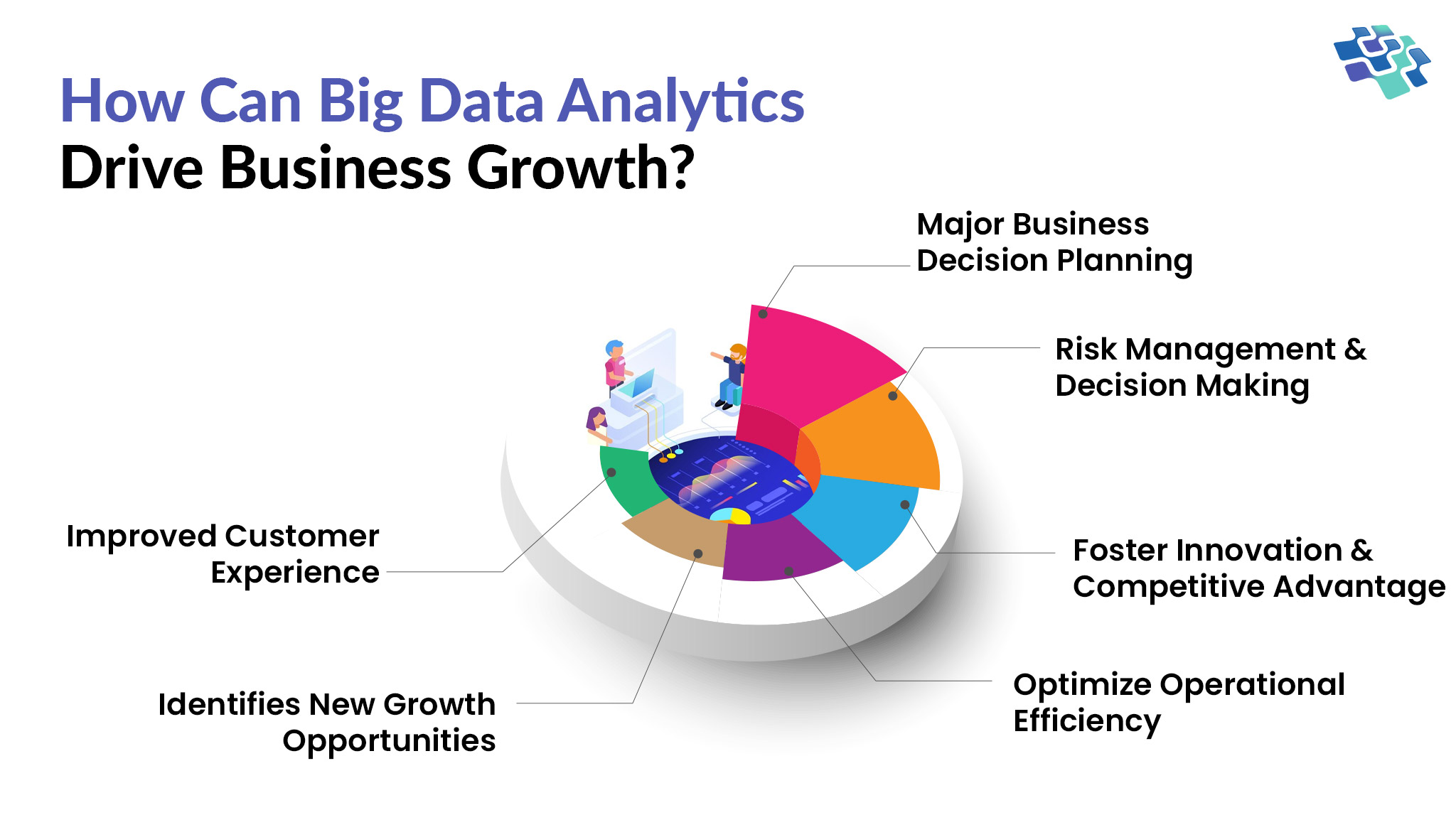How is Data Analytics in Business Driving Growth?
Businesses are heavily investing in data analytics due to the value of data and the insights that can be gleaned from it. It was predicted that big data analytics in business will expand globally by more than $274 billion. 87.8% of businesses said they invested more in data analytics. Examining how data analytics in business contributes to growth is vital when every organization considers data analytics as an essential resource.

Struggling With Data Silos? We Can Unify & Analyze Your Data for Better Insights

“Companies using data-driven B2B sales-growth engines report above-market growth and EBITDA increases in the range of 15 to 25%. B2B sales-growth champions pull five mutually reinforcing levers systematically to empower their sales organization to derive impact from insights and to be able to improve value-based opportunity prioritization, frontline delivery, and continuous learning.”– Mckinsey
Importance of Data Analytics in Business
In today’s data-driven world, data analytics in business has become an essential tool. It is impossible to overstate the significance of data analytics since it gives businesses insightful knowledge about their clients, employees, and industry trends. Businesses that can gather and evaluate vast amounts of data are better equipped to make decisions that propel expansion and offer them a competitive advantage.
Businesses that use data analytics effectively might spot patterns and trends that might have gone missing otherwise. They can improve client experiences, increase productivity, and optimize their processes thanks to this invaluable information. Additionally, data analytics gives businesses the ability to foresee changes in the market and proactively adapt to stay one step ahead of the competition.
AI-Powered Analytics
To find hidden patterns, trends, and correlations in huge datasets, artificial intelligence-powered analytics combines the strength of artificial intelligence with sophisticated analytics approaches. By employing machine learning algorithms to automatically evaluate data, find insightful patterns, and generate predictions based on that data, it goes beyond conventional techniques. This helps companies to make well-informed decisions swiftly and effectively.
Businesses can get a multitude of advantages by utilizing AI-powered analytics. They may improve overall decision-making processes, reduce risks through predictive analysis, detect fraud or anomalies in real time, and obtain a deeper understanding of the preferences and habits of their customers. Organizations may remain ahead of the competition in today’s fiercely competitive market by utilizing AI as a strategic tool.
Get Custom Big Data Analytics Software Solutions
Various Types of Data Analytics in Business
- Predictive Analytics: Utilizing statistical modeling resources and historical data, predictive analytics makes predictions about future trends and events. It supports businesses in anticipating consumer behavior and making proactive decisions.
- Descriptive Analytics: Understanding historical data to learn about prior performance, trends, and patterns is the main goal of descriptive analytics. It creates a foundation for deeper research and thoughtful decision-making.
- Prescriptive Analytics: Prescriptive analytics is more than just forecasting future results. Based on data analysis, it recommends the best courses of action, empowering organizations to make well-informed decisions and attain their goals.
- Diagnostic Analytics: The goal of diagnostic analytics is to pinpoint the reasons underlying results or occurrences. It entails data analysis to determine the causes of previous achievements and setbacks.
Struggling with Data-Driven Strategies? Let Us Help You Unlock Actionable Insights from Your Data
How Can Data Analytics Drive Business Growth?
Data analytics in business is becoming an essential resource to combine data from many sources and provide extremely significant insights for winning business plans. Forecasting events and identifying trends and opportunities helps a business become future-ready.
1. Improved Customer Experience
The expectations and demands of customers are always evolving in the contemporary digital and tech-driven environment. Additionally, there are a lot of options available to consumers today, which makes it difficult for firms to attract and keep clients. To persuade and keep customers, firms must therefore possess a greater understanding of their behavior, interests, and demands. Businesses may take advantage of this from data analytics.
Businesses may provide customers with more individualized experiences by using data analytics to obtain insightful insights about customer behavior and preferences through customer data. Data-driven companies are six times more likely to retain clients and are 23 times more likely to attract new ones, per the McKinsey poll. Additionally, happy consumers have been observed to spend 140% more. These elements demonstrate how customer-specific data analytics may boost customer experience and loyalty, resulting in quick company expansion.
2. Identifies New Growth Opportunities
Businesses seek to take advantage of emerging growth prospects to gain a competitive advantage. It has been observed that data analytics is quite useful for locating and seizing fresh growth prospects. Businesses can identify growth possibilities and obtain a greater understanding of customer behavior and industry trends by utilizing the multitude of data sources at their disposal, including sales data, customer interactions, market and economic situations, and similar ones.
Data analytics in business is becoming increasingly popular as a tool for analyzing past data to forecast future events, analyzing customer feedback to spot trends, and analyzing various client segments to comprehend behavioral patterns. Indeed, according to 62% of retailers, analytics, and intelligence are giving businesses a competitive edge. In summary, firms can find and seize new growth possibilities by properly utilizing the power of data analytics.
3. Optimize Operational Efficiency
Businesses’ operations become more complex as they expand. Putting a data analytics approach into practice can help find opportunities for automation, redundancies, and bottlenecks that can increase operational efficiency. Decision-making procedures can be steered toward greater service delivery, cost savings, and operational efficiency by using data-driven insights.
Through this optimization, the company is guaranteed to be responsive and flexible, able to take advantage of new opportunities and difficulties as they present themselves.
4. Foster Innovation & Competitive Advantage
A well-executed data analytics strategy can serve as a major source of innovation, helping companies spot and seize special possibilities. Through the examination of nascent trends, client input, and rival environments, enterprises can create novel offerings that differentiate them from their rivals.
Data analytics is helpful not just in identifying these opportunities but also in confirming the viability of creative concepts. As the company grows, this continuous cycle of innovation—supported by insights gleaned from data—makes sure it stays relevant and competitive.
5. Risk Management & Decision Making
There is always a risk associated with expansion, thus being able to anticipate and reduce these risks is a vital skill. Through the critical lens that data analytics offers, organizations may assess probable future situations, weigh the advantages and disadvantages of various strategies, and make well-informed decisions.
Companies can better foresee issues and develop strategies to manage or reduce them by examining trends, market conditions, and internal performance data. Stability and sustained growth are supported by this well-informed approach to risk management.
6. Business Decision Planning
Data analytics can assist in making important business decisions, such as organizing the growth of corporate units. Businesses typically have a lot of idle data on their client base, employee payments, upkeep of equipment and other assets, and delivery or distribution scheduling. All this data may be analyzed by data analytics, which can then recommend appropriate planning steps to create a successful business expansion plan.
Top decision-makers may make well-informed decisions quickly by using dashboards and visuals to convey derived insights. Data analytics has been utilized by large e-commerce enterprises such as Amazon to avert significant shipping failures.
Facing Data Management Challenges? Transform Your Business with Our Expert Data Analytics Services Today
What Data Analytics in Business is Needed to Maximize ROI?
The leadership of businesses can start by emphasizing how using data creates value and optimizes return on investment when transforming the company culture to one of data-driven decision-making.
Research has indicated that investing in data analytics can lead to several benefits, such as higher revenue and lower expenses. After investing in Big Data and AI, executives identified six areas in which their organizations experienced quantifiable outcomes. Notably, 60% of respondents said their expenses have decreased for professionals.
For each of their firms, organizations should be able to respond to the following questions to achieve results that yield outsized returns:
- Which products and services yield the highest profits?
- What products and services are the best sellers, and who is their target market?
- Which parts of the business process are the most expensive, and what factors—such as labor, raw materials, energy, or time—drive those costs?
Businesses are gathering information from distinct data sources while attempting to organize and analyze already-existing data, which makes it more difficult to use data effectively. Businesses can begin addressing this issue by figuring out precisely which data pieces add the most value.
Using Data to Drive Business Transformation with NextGen Invent
In today’s market, data analytics in business is a cornerstone of growth and innovation. By leveraging data, companies can uncover valuable insights, optimize operations, and create personalized customer experiences. NextGen Invent’s custom big data analytics software development services are designed to drive this transformation. Our solutions enable businesses to harness the power of big data, providing comprehensive analytics that turn raw data into actionable intelligence.
With NextGen Invent, businesses can implement advanced data analytics strategies tailored to their specific needs. Our expertise in developing scalable, secure, and efficient analytics platforms helps businesses identify trends, predict market shifts, and make data-driven decisions with confidence. Whether it’s enhancing customer engagement, improving operational efficiency, or innovating new products and services, our custom software solutions are pivotal in achieving these goals.
NextGen Invent’s commitment to innovation and excellence ensures that your business stays ahead of the curve. By integrating innovative technologies and methodologies, we help you unlock new opportunities and drive sustainable growth.
Ready to transform your business with data analytics? Contact us today to learn more about our data science development and custom big data analytics software development services!
Related Blogs

Data Mining for Business Intelligence: How Can It Help?
One of the most essential abilities for business success nowadays is the ability to derive significant insights from large amounts of data through data-driven initiatives. Fundamentally, data mining is more than just a trendy term in IT.

Data Governance Strategy: A Must Have for Every Organizations
The business landscape is undergoing a significant digital transformation, driven by emerging technologies like analytics, AI, automation, and cloud computing. Data acts as the linchpin, connecting these diverse technologies.

6 Data Management Best Practices to Improve Data Performance
Data management best practices are the cornerstone of any organization’s strategic framework, facilitating the lawful and efficient utilization of data for informed decision-making and actions. This encompasses a spectrum of tasks like data collection.
Stay In the Know
Get Latest updates and industry insights every month.

